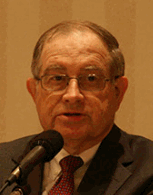|
|
|
|
|
|
|
News & Views item - January 2009 |
![]() Following an Initial US$13 Billion Boost for US Science, Then What? (January
22, 2008)
Following an Initial US$13 Billion Boost for US Science, Then What? (January
22, 2008)
 |
|
Professor Neal Lane |
TFW noted on January 16 that the draft text of the American Recovery and Reinvestment Bill of 2009 -- the supplemental appropriations bill forming the spending part of the US$850 (A$1,263) billion economic stimulus package to deal with the depressed US economy -- contained over US$13 billion for research and development projects.
The major part of the package, should it be approved by the US Congress and President Obama, would need to be spent over two years, with funding for peer-reviewed grants to be awarded within four months. This has led Elias Zerhouni, former director of the NIH, to point out that the funding package does not focus enough on sustaining scientists, but rather too much on the infrastructure that houses them. He says the proposal as it is formulated: "is too timid and not strategic enough in addressing the long term; it's short-term wise but long-term ineffective."
Perhaps presaging legislation to come, the chairman of the House of Representatives Science Committee, Bart Gordon (D,TN) says the bill is a long-delayed down payment on the American Competitiveness Initiative, which emphasises research and education in maths, engineering and the physical sciences.
And Neal Lane, professor of physics and astronomy at Rice University in Houston, Texas, and a former science adviser to President Bill Clinton told Nature that agencies such as the National Science Foundation (NSF) and the Department of Energy should be able to absorb and spend the additional funding quickly, partly because they have been planning for increased funding under the competitiveness initiative. The NSF in particular has been faced with a backlog of requests and peer-reviewed proposals for facilities and construction of major research equipment. "Those seem like reasonable places to make a quick and early investment. The researchers out there could actually spend a lot of money wisely and quickly if it were made available to them," Professor Lane said.
The New York Times reports: Staff members throughout the government’s scientific agencies held inaugural parties on Tuesday, and many reported being teary-eyed with joy: “If you look at the science world, you see a lot of happy faces,” said Frank Press, a former president of the National Academy of Sciences and former science adviser to President Jimmy Carter. “It’s not just getting money. It’s his [President Obama's] recognition of what science can do to bring this country back in an innovative way.”